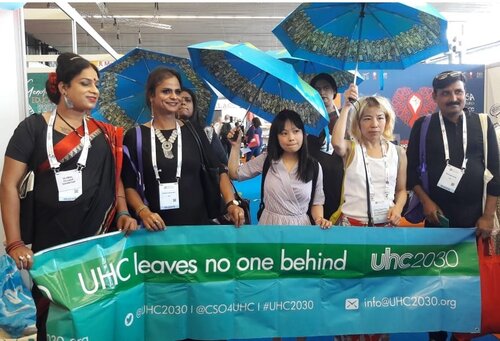UHC2030 is excited to welcome several new and distinguished...
8 October 2018
Civil society active in calling for universal health coverage at AIDS 2018

The 22nd International AIDS Conference (IAC) was held in Amsterdam, Netherlands from July 2327, 2018 and CSOs were present to highlight UHC in the HIV response.
The conference brought together multiple stakeholders to advance knowledge on HIV, promote human rights and evidence-based approaches, galvanise political commitment and accountability among governments and highlight both gaps and successes in the global HIV response.
A number of events incorporated the importance of UHC in the HIV response. Specifically, CSEM Advisory Group (AG) member Dr. Khuat Thi Hai Oanh served on a panel at the WHO-sponsored Satellite Session on HIV and UHC. During this session, Dr. Oanh emphasized the role of civil society in strengthening health and community systems to achieve UHC and eliminate HIV. She further addressed reaching those populations most affected and marginalized, eliminating structural barriers and promoting human rights which is a central theme in UHC and communicable disease elimination efforts.
The AG members also participated in a pre-conference dialogue for civil society organizations led by WHO Director General Dr. Tedros Adhanom Ghebreyesus. During this session, CSOs raised issues around how different health programmes should work together to achieve Health Systems Strengthening and UHC.
They took this opportunity to reiterate our request for collaboration on guidance to both governments and WHO country offices on how to engage with civil society. Keep an eye out in upcoming issues of CSEM Voices for UHC-related outcomes from AIDS 2018 and follow us on Twitter for some of the highlights.
Information on all events is available on the IAC website. CSEM Advisory Group member Dr. Santosh Kumar Giri organized a rally to raise awareness and mobilize support for UHC (see photo). She also participated in a dance that expressed the need for the inclusion of transgender People Living with HIV (PLHIV) and youth.
The dance programme was staged by six transgender people (kothi, hijra) and PLHIV community members from small-town and rural areas of West Bengal, India. The dance depicted a young transgender woman who is beaten by her male partner and ostracized by her family and society after it is discovered that she is living with HIV. Other trans and PLHIV youth gather and resist the violence against the trans person. Through their solidarity, they succeed in reintegrating the victimised trans woman with her family and neighbours, and perform a celebratory dance set to poet Rabindranath Tagore's words, “If no one answers your call, walk alone.” The performers conclude with a demand for universal health coverage for all.
Watch the film here!
View UHC2030's short animation here.
Thank you to the UHC2030 CSEM Secretariat for providing this article.
